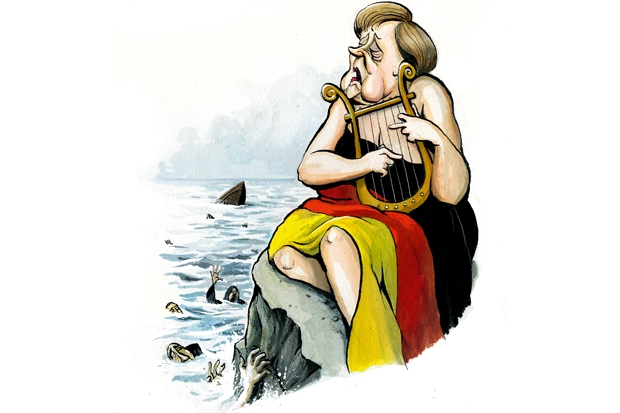Crisis? What crisis? Here in prosperous Munich, it’s hard to believe the EU has taken such a battering this year – but then again, the Bavarian capital has always been a place apart. It has the strongest economy and the lowest unemployment of any German city. It is the headquarters of world beating companies such as Allianz, Siemens and BMW. Its cultural scene (and its football team) is among the best in Europe. During Advent, its city centre is especially handsome – a boozy maze of Christmas markets. People are earning and spending, having fun and getting tipsy. I mean to say, what’s not to like?
Superficially, Munich’s residents seem to have little to complain about. On the doorstep of the Alps, with its warm summers and crisp cold winters, their city tops the polls as the place where most Germans would like to live. Germans and Italians call Munich Italy’s most northern city. Milan is nearer than Berlin, and Italians have always flocked here – to work or study or make merry, in an Italianate city where everything works.
Yet if you get talking to a few locals, the situation looks a lot less rosy. Since my last visit, just before Brexit, Bavarians have become more pessimistic, and the main reason – to my mind – is a political system which shackles Bavaria’s ruling party, the Christian Social Union, to its far bigger sister party, Angela Merkel’s Christian Democratic Union.
On the surface, the CDU and CSU seem pretty similar. They’re both moderate conservative parties, Teutonic Tory Wets. Yet the CSU has always been more conservative than the CDU, reflecting the traditional conservatism of Catholic Bavaria. Normally, this doesn’t matter much – the two parties usually rub along together fairly well. The CSU only ever fields candidates in Bavaria, the CDU fields candidates everywhere except Bavaria, and every four years they team up in the Bundestag, more often than not as the biggest party in the German government. The CDU and CSU always field a joint candidate for the Chancellorship, and on the two occasions when that candidate has come from the CSU, that candidate was soundly beaten by Germany’s left leaning SPD. For German conservatives, the lesson is clear: the CSU is virtually unbeatable in Bavaria, and unelectable outside Bavaria. Hence the electoral pact which has won the lion’s share of elections since the Second World War.
However this happy compromise has been undermined by the 2013 election, which Merkel won, but only by forming a so-called ‘grand coalition’ with the SPD. Since then, Merkel has moved leftwards, hoovering up SPD support. Outside Bavaria, this move has been politically astute. Merkel gambled that her conservative supporters had nowhere else to go, and although Alternative fur Deutschland gave her a scare in autumn’s regional elections, Trump’s unlikely triumph has rescued her from AfD. With foreign policy now so uncertain, Merkel seems unassailable. Her domestic shortcomings (particularly the refugee crisis) have been eclipsed by her international stature.
This, in a nutshell, is why Bavarians are so disgruntled: Munich was the first stop for Merkel’s million Middle Eastern refugees. To Bavaria’s conformist voters, the AfD is an anathema, yet Merkel’s liberal conservatism no longer represents their views. This summer, for the first time ever, there was talk of the CSU fielding a separate candidate for the Chancellorship, but this talk has come to nothing. Trump has shut down that debate. In Munich (like most other German cities), the SPD is the ruling party, but Bavaria as a whole has always voted CSU. The CSU has lost just one regional election in the last fifty years, yet their voters feel impotent. Where else can they go?
At BMW Welt, BMW’s glitzy museum-cum-showroom, I talked to the boss of one of Bavaria’s renowned Mittelstand companies – one of those medium sized firms (fewer than 500 employees, less than €50 million annual turnover) that form the backbone of the German economy. Like so many Mittelstand companies, it’s a family firm – it’s been in his family for six generations. In his Loden jacket he personifies the astute traditionalism of the sensible Bavarian businessman – prudent and conscientious. His business was thriving. He had every reason to be cheerful, but his pessimism was palpable. Germany is changing fast, and even affluent Bavaria is no longer immune.
How can the CSU recover its Bavarian Mojo? How can they serve this Mittelstand boss and his employees? These people will never vote AfD, but they need a party which will speak for them. For the CSU, the only solution is a looser relationship with Merkel’s CDU. The CSU has been down this road a few times before, only to draw back at the final hurdle. Yet with the revival of Germany’s centrist Free Democratic Party, it looks likely that, for the first time, there will be as many as seven parties in next year’s Bundestag: the SPD, the Greens and Die Linke on the left, plus the CDU/CSU, the FPD and (for the first time) AfD. The fragmentation of German politics gives the CSU a unique opportunity. Unlike the Scottish National Party, they don’t want independence. But at next year’s elections, with the vote split seven ways, they finally have a chance to give Bavarians a truly independent voice.






Comments